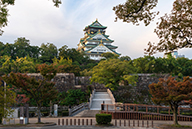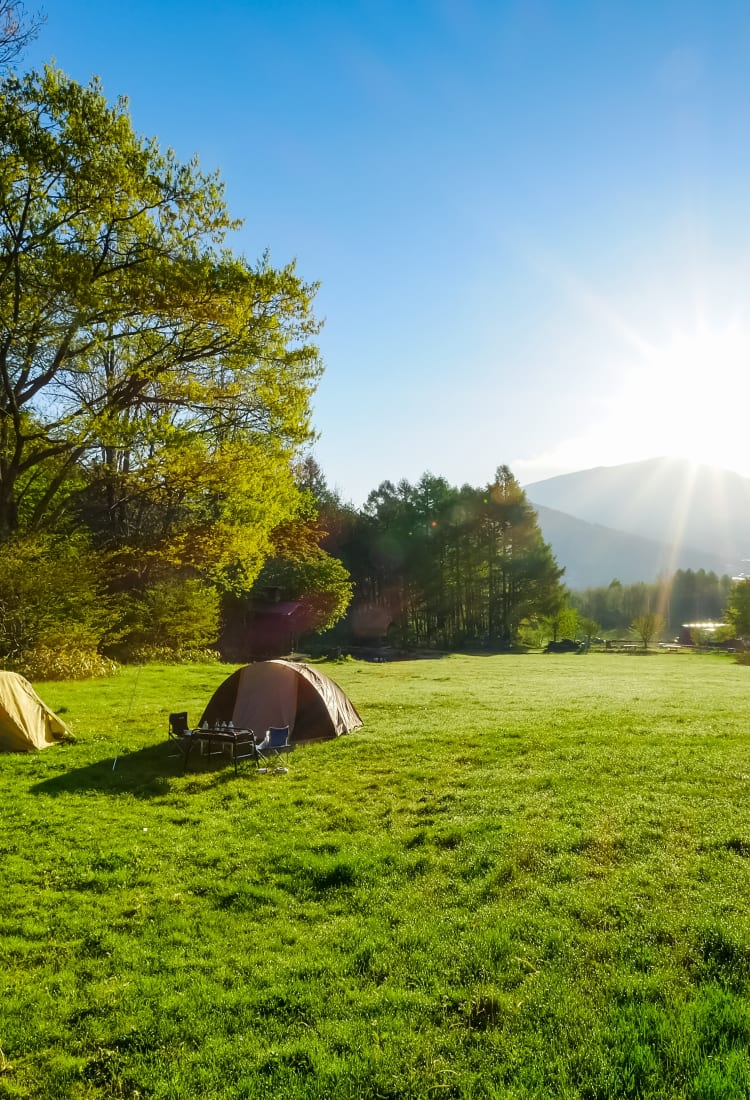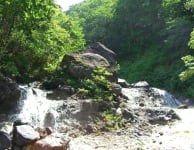Explore Japan's wilderness by camping in Japan
Camping is a great way to immerse yourself in Japan's natural landscapes. As far as budget travel options go in Japan, you'll be hard pressed to find an alternative that's quite as memorable.
Among locals, camping is very popular in the summer months, especially during school holidays from late July through August. Golden Week, in May, is another popular time, and the public and bank holidays see swarms of city dwellers flocking to the great outdoors for much needed R&R.
With about 3,000 campsites scattered across the country, you're sure to find a location that suits your needs, though reservations are highly recommended. For a list of where to go camping in Japan, check out our guide on campsites across nine areas, including prices, directions and other information on over 60 locations.
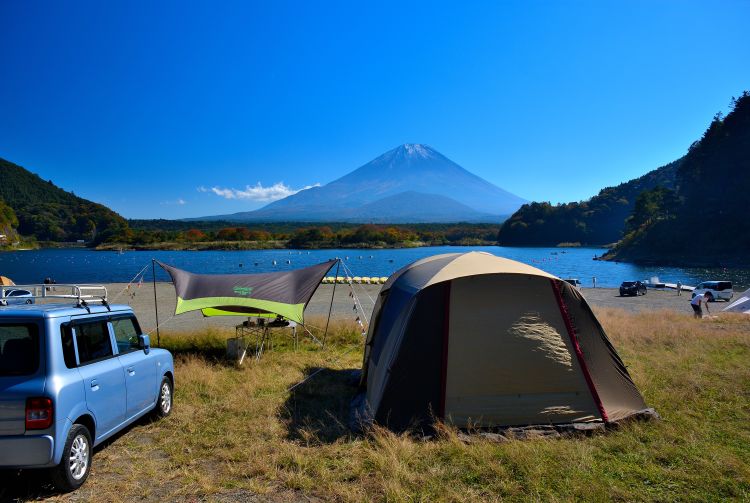
Most of Japan's campsites are free
How much does it cost?
Whatever your budget, there are campgrounds and campsites to meet your needs.
Many campgrounds in Japan are totally free, but most of those with facilities will charge you to stay. Some campgrounds charge per person, some charge a flat fee per tent, while others charge a base fee plus additional fees for more people.
Prices vary, but smaller campsites generally start as low as 400 yen per person up to 3,000 yen for the whole site. If you'd like to be near nature but have no interest in sleeping outside, many campgrounds rent bungalows, yurts, lodges and cabins ranging from 4,000 yen to 30,000 yen per night.


Most Japanese campsites are well-equipped
What to expect
In Japan, campgrounds generally come with amenities, including running water and electricity. There are usually toilets and sinks, and many are near onsens. Some of the larger campgrounds feature activity areas with tennis courts, playgrounds and fishing ponds. Campfires are usually prohibited in Japan, but most locations allow you to bring a fire pit.
The majority of Japanese campsites either sell or rent the essentials (minus food and clothing), so you may not even need to pack your tent. However, for peace of mind, bring essentials such as a tent, sleeping bag, a fire pit and/or gas stove, a lighter and matches, pots and pans, eating and drinking utensils and trash bags. Always keep your campsite clean and never leave any garbage behind.
When you're exposed to the elements, it's better to be safe than sorry. Plan to dress in warm layers as the evening chill sets in and remember to pack ample sunscreen and insect repellent, too. It's recommended to arrive at your site before dark, as there are usually no lights. Always bring a few flashlights with extra batteries, just in case.
Access to campgrounds via public transportation can be limited, so check ahead if that's how you plan to arrive.

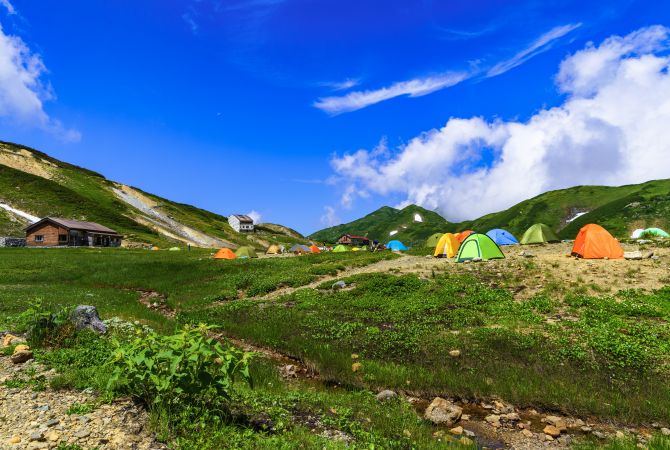
Wake up to iconic views in Japan's national parks
Camping in Japan's National Parks
The National Parks of Japan give you a chance to experience the very best of the country's landscapes, and camping is a great base from which you can explore.
Shiretoko National Park in Hokkaido is one of Japan's most remote locations. With sites like the Kamuiwakka Hot Waterfalls , endless hiking and biking trails, and year-round wildlife sightings of deer, bears and foxes, you'll want to stay a few days, at least. The Shiretoko National Camping Grounds give you access to all there is to see and do. If you're arriving in winter, check out the famous drift ice in the Okhotsk Sea.
In the Northern Japan Alps of Nagano is Kamikochi , a popular lakeside resort. Entry to and from the area is only permitted via shuttle bus or taxi, ensuring the fresh air and seclusion you're craving. Stunning views of Alpine lakes and lush forests greet you upon arrival, but you won't be entirely cut off from the world. Konashidaira Camping Grounds have everything you need, from tent and cabin rental to equipment hire, and even a restaurant.
Down in Kyushu, Kirishima-Kinkowan National Park's Kirishima Kogen Kokumin-kyuyochi campgrounds have amenities such as onsen, tennis courts and swimming pools, and activities like hiking, cycling and horseback riding, all with a backdrop of the Sakurajima volcano If beach camping is on your bucket list, pitch your tent steps away from the white sands and turquoise waves of Yagachi Beach in Okinawa. Its shower facilities, store and rental services (including boats and bicycles), offer everything you need for a relaxing, comfortable stay by the sea.


Even Tokyo offers camping opportunity
Camping in and around Tokyo
Even the city of Tokyo has campsites. Wakasu Seaside Park and Jonanjima Seaside Park are both within city limits, and between them have many campsites, barbeques, boardwalks, and a go-kart track and skate park. Just outside the city, Chiba and Saitama also have campgrounds.
Travel a little further (two hours by train), and you'll find Hakone, an area famous for its shrines, hot springs, and the awe-inspiring Lake Ashinoko . Formed 3,000 years ago from Mt. Hakone's final eruption, Lake Ashinoko—with Mt. Fuji as a backdrop—is Hakone's most famous view. The area features hiking and walking trails, sightseeing cruises and onsen. To make the most of the surroundings, skip the hotels and stay on the campgrounds.
Okutama, about two hours by train from Tokyo, is an idyllic spot for campers. Its beautiful lakes and picturesque mountains, offer opportunities for hiking, swimming, fishing and rock-climbing. While in the vicinity, check out Nippara Limestone cave. The cave was discovered in 1963, and is one of the largest of its kind in the Kanto area. If it's too much to squeeze into one day, the nearby campgrounds rent gear or offer chalets so you can extend your stay.

Camping with a car or van is hugely popular in Japan
Car camping
Car camping, or auto camping as it is known in Japan, is a popular type of camping. These campsites allow you to park your vehicle and pitch your tent right next to it. There's usually enough space for a tent, tables and chairs, but most auto campsites allow only one tent per vehicle, so if you're in a large group, book a few sites. A lot of campgrounds have limited access to public transportation, so renting a car and auto camping is a convenient way to explore more remote parts of the country. Just remember to specify that you need an auto-camp site when making reservations, or you might find yourself without a spot to leave your car.
RVs and campers are also available to rent in Japan, as are campgrounds with RV hookups, but it's not a common option. However, a few campgrounds offer camper rental onsite.

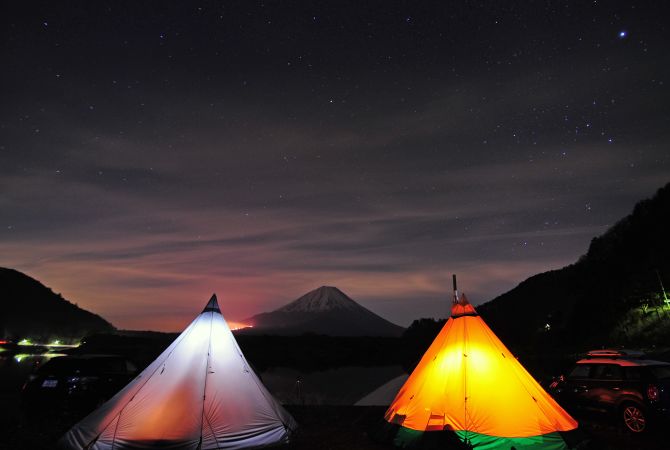
Camping can be a luxurious affair in Japan
Luxury camping or “Glamping”
Luxury camping in Japan is another fairly new trend. Glamorous-camping, or “glamping,” is an alternative for those who want to experience the beauty of the great outdoors without the hardships.
In Japan, travelers can choose to stay in cottages, cabins, yurts or private bungalows. Some glamping resorts have secluded accommodations that can only be accessed by canoe, while others feature tree houses you have to climb up to. More adventurous travelers can try sleeping in a suspended tsurushi tent up in the treetops.
Glampsites will usually have restaurants on-site or nearby. Some of the more luxurious locations serve fine dining options made with locally sourced ingredients and created by master chefs. Other sites might offer a typical American barbecue feast to enjoy in your bungalow. Whatever glamping adventure you seek, Japan's luxury campsites have got you covered.
The latest information may differ, so please check the official website

















































